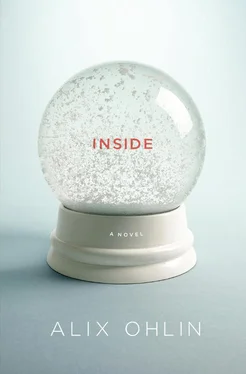She couldn’t think of another time when the two of them had ever been alone together. Hilary was always there, her body a buffer between them. Alan reached down and picked up a heavier barbell. They were his prized possessions, these weights, and they gleamed in the light. He faced the window, curling his biceps and panting with every lift. She stepped closer to him — he smelled sweaty and gross — and tried to catch his eye, but he wouldn’t look away from his muscles.
“Listen,” she said. “You know you guys can’t stay here forever. I hope you’re saving some money. Once the baby comes, you’re going to have to support them. You’re going to have to grow up.”
But once she’d delivered these lines she felt ridiculous. What did she know about supporting a family? She had been in Hilary’s position once, and had made the opposite choice. She’d left her parents behind too, getting as far away as she could from any kind of family. Thinking back on it, she could barely remember what thoughts had guided her decisions, or if she had had any thoughts at all. That time in her life was a blur of hate: her father was awful, her mother pathetic, both of them so self-absorbed they barely noticed anything she did. Anything she had made of herself, she’d accomplished without them. The one person who’d been kind to her back then was her therapist, and that was only because it was Grace’s job. Thinking about this made her angry all over again, and the anger flowed onto Alan, whose only reaction to her statement had been to shift the barbell from one hand to the other. She could see his lips moving as he counted repetitions.
“Have you even thought about where you’re going to live?”
With a groan, he set the weight down. He was wearing a dirty tank top and his white skin shimmered with sweat. When he straightened up, his face was flushed with blood. “Why don’t you shut up?” he said.
Anne felt a physical ripple across her face, as if he’d slapped her. “Excuse me?”
“You act like you know everything. But you don’t. Just mind your own business.”
“Hard to do when you’re living in my apartment.”
“So you think you can boss us around? Act like you’re better than us?”
“I don’t even know what you’re talking about.”
“You’re just some stuck-up bitch,” he said, turning away.
Flashing with anger, sparks in her veins, she grabbed his arm and yanked it. She could tell he was surprised by how strong she was. “You shut the fuck up,” she said. “You’re nothing. Nothing . You owe me.”
Her fingernails scraped his clammy skin as he pulled his arm away, and she liked what she saw in his eyes. He was scared.
May came to the city, the bloom of trees a wistful pink against a pale sky. In the parks the memorials were fading, the pictures of the missing now gray and tearing around the edges. Old dried flowers bobbed their stiff heads in the wind; jars that had once held candles lay empty on their sides. The streets seemed ribboned with litter. And yet the weather was pretty, and people gathered at tables outside restaurants, glad to feel the sun on their faces again.
Anne’s play opened, and she was good in it; she knew she was. The audiences were tiny, mostly hipsters and college-theater nerds who went to see everything, but it was enough. There were reviews in two weeklies, and one called her performance “compelling.” She cut the reviews out and pasted them in a scrapbook next to the playbill, something she hadn’t done since high school.
She gave Hilary and Alan tickets for a Friday-night show, and when they didn’t turn up she was angrier than she would’ve expected. She had sacrificed her apartment to these runaways, and they couldn’t even get it together to sit through two hours of theater? And the worst part was that she couldn’t get mad at them, because the whole deal, the basis of the relationship, was that they needed her, not the other way around. To tell them she was disappointed would have been to lose whatever thin emotional edge she still possessed. She assumed Alan had told Hilary about their confrontation, and that was why they hadn’t come.
When she got home that night, though, they weren’t there. This was more than unusual — they spent every night in front of the TV. Maybe they’d gotten lost on the subway? They were just two teenagers from the country. But they had left their families, without a word of explanation, and probably their parents had stood silent and gape-mouthed in their homes, just like she was now, wondering where they were.
At three in the morning, sleepless, she heard the door open. She went to the living room and saw Alan leading Hilary to the couch.
“What happened? Is everything okay?”
“She had a fever and kept throwing up.” Alan’s voice was gentle. “We went to the emergency room. We were worried it was going to hurt the baby.”
“And what did they say?” Anne turned on the fluorescent light in the kitchen, and in its blue glow Hilary looked wan, her face an uneasy gray.
“It was food poisoning, they told us. We think from Panda Kitchen.”
“What are we supposed to do? Does she need some water? I could get some ginger ale.”
Alan shook his head. “They put her on an IV for a while, so right now it’s okay. She probably just wants to sleep.”
In other words, she understood, go back to bed and leave us alone. “What about the baby? Is the baby going to be all right?”
“Doc said no problem,” Alan said. “Young healthy mom, should be a young healthy baby.”
“Okay.” At the bedroom door she turned around and said, “I’m sorry.” She waited for him to say it was all right, but he didn’t.
In the morning Hilary’s face still looked bad, as waxy as fake fruit. She kept pawing at the blanket around her and shifting her massive weight around the tiny couch.
“I’m cold,” she said. “I’m hot. I don’t feel good. My skin hurts. I have a fever.” She threw these statements into the air, expecting someone to catch them. Alan wanted to stay home from work, but Anne told him he should go; she’d be home all day and could take care of her.
“I’m sweaty,” Hilary said. “My clothes stink. I’m dizzy.”
Feeling at once guilty and pitying, Anne said, “Maybe you should sleep in my bed instead. It’s probably more comfortable.”
Which is how she came to give up her bedroom and live on the couch herself.
It made more sense, really. Hilary spent her days beached on the bed, reminding Anne of her mother, who in the difficult time before Anne left home had passed most weekends this way. Her mother stole into her mind more and more often these days — her voice, her smell, her small, pleading smile, the childhood games they’d played. Anne would never have admitted she missed her; these thoughts were probably just from being around Hilary, wondering what kind of mother she was going to be.
Once Hilary was settled on the bed she treated it as her unassailable kingdom, her lily pad, her island. Every time Anne came back to the apartment, even before closing the door, she would hear Hilary calling her name from the bedroom. Then she would glance through the doorway and see her propped up on cushions, a National Enquirer open beside her, its pages crumpled from where she’d napped on them, a plate of half-eaten food on the nightstand, the bed dotted with candy wrappers and tissues.
“Anne? Could you bring me some ice cream?”
For her entertainment the television had been moved into the bedroom. Alan had moved in there too, but he still slept on a pallet on the floor beside her. Day by day Hilary was becoming more childlike, unable to do anything for herself, but she was also growing more demanding and physically imposing, a capricious giant whose whims must be appeased.
Читать дальше












